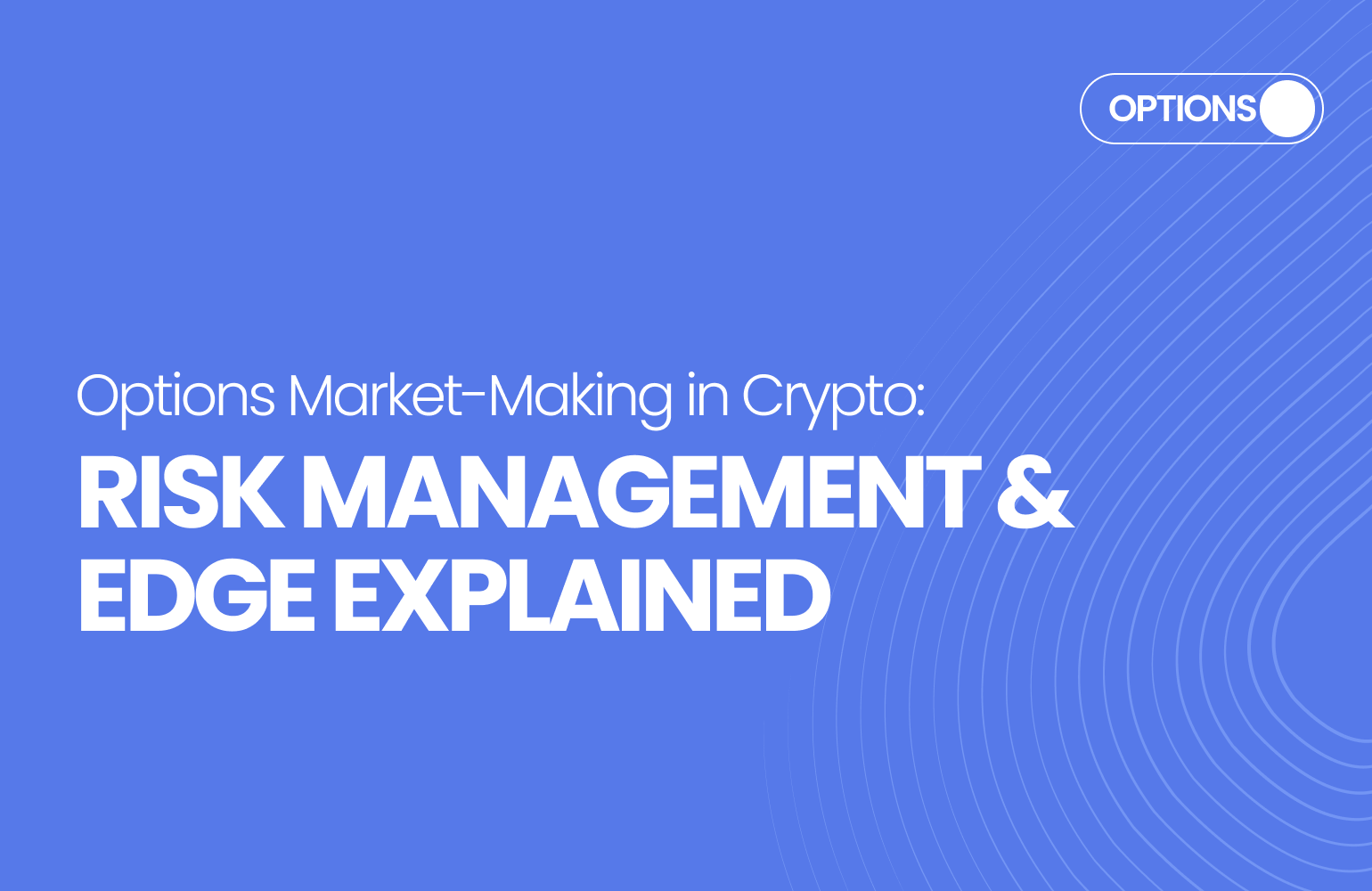Understanding Options Market Making
Ever wondered who’s always ready to buy or sell your crypto options trading contracts, regardless of time or volatility? The answer: options market maker.
In the crypto options market, market makers are the invisible engines providing consistent two-way quotes, tightening spreads, and ensuring efficient execution. But they’re not just blindly quoting prices, they operate with complex risk models and hedging strategies that give them both liquidity and edge.
This blog dives into how options market making works in crypto: from quoting mechanics and delta hedging to risk controls and P&L strategies.
What Is Options Market Making?
So, what is options market making?
At its core, options market making involves:
- Quoting both bid and ask prices for options contracts
- Profiting from bid-ask spread, volatility edge, and time decay
- Using hedging to manage directional, gamma, and vega risks
Options market makers enable liquidity on platforms like Pi42, Deribit, and Binance Options, making it easier for traders to enter and exit the options market efficiently.
How Market Makers Quote Options
Market makers build dynamic models to set prices based on:
- Implied Volatility (IV)
- Underlying price movements
- Orderbook depth and rival quotes
- Greeks (Delta, Gamma, Theta, Vega)
- Expected slippage and latency risks
Bid-Ask Spread Explained
The difference between the price a options market maker is willing to:
- Buy an option (bid)
- Sell an option (ask)
They aim to capture this spread profitably, even as prices fluctuate, this is the essence of options market making in the crypto options market.
Risk Management: The Core of Market-Making
Delta Hedging
Since options have directional exposure (delta), market makers:
- Constantly buy/sell spot or futures to offset delta
- Update hedges dynamically as delta shifts with price movements
Example: If a market maker is net short delta (sold calls), they buy spot BTC to neutralize.
Gamma & Vega Exposure
- Gamma risk: Delta changes rapidly, requiring more frequent hedging during high volatility.
- Vega risk: Exposure to implied volatility changes, especially when selling options.
Inventory Controls
Options market makers use systems to:
- Avoid overexposure in certain strikes or expiries
- Auto-pull quotes if skew becomes too wide
- Adjust spreads dynamically during high-risk events (e.g., CPI, FOMC)
Read More: Option Greeks Explained: Delta, Gamma, Theta, Vega, Rho
Technology Behind Market Making
| Component | Purpose |
| Quoting Engine | Dynamically prices bid/ask spreads |
| Risk Engine | Monitors P&L, Greeks, margin thresholds |
| Auto-Hedger | Places offsetting spot/futures orders |
| Latency Monitor | Ensures quotes are canceled quickly |
Most crypto options market making systems run on custom Python or C++ infrastructure linked via WebSockets to exchanges.
How Market Makers Gain Edge
1. Volatility Edge
- Quote options slightly above fair value IV
- Capture time decay (theta) while hedging directional risks
2. Speed Advantage
- Low-latency systems cancel stale quotes instantly
- Re-price faster than rivals
3. Statistical Modeling
- Historical volatility, order flow, and skew analysis
- Identify mispriced options in the options market
Real-World Example: BTC Options Market Making
A options market maker on Pi42 or Deribit might:
- Quote a 1% wide spread on BTC weekly options
- Maintain a delta-neutral book by hedging every $200 move in BTC
- Monitor open interest and IV skew to adjust positioning
- Cancel or widen quotes 5 mins before major news (e.g., CPI print)
They earn:
- Bid-ask spread on every filled trade
- Theta from sold options
- Vega edge if volatility drops after a spike
Challenges in Crypto Options Market Making
| Challenge | Mitigation Strategy |
| Low liquidity on altcoins | Focus on BTC, ETH where spreads are tighter |
| High volatility spikes | Use wider spreads, auto-pull mechanisms |
| IV crush post-event | Hedge vega pre-event or avoid quoting |
| Regulatory uncertainty | Operate on compliant, licensed exchanges |
Tools for Aspiring Options Market Makers
- Quantlib / PyQL: Build volatility surface models
- Deribit / Pi42 APIs: Access market data and order management
- Greeks Calculators: Monitor delta, gamma, theta in real-time
- Latency Tools: Essential for cancel-on-move logic
Conclusion
Options market makers aren’t gamblers, they’re engineers. They blend data, discipline, and delta to create order in chaos.
If you’re a trader executing in the options market, you’re benefiting from crypto options market making that keeps spreads tight and liquidity deep.Want to see market-making in action?
Trade options on Pi42, where deep liquidity and tight spreads are powered by professional-grade market makers.
Read Related
Crypto Market Making: What is it & How it Works
Option Premium in Crypto: What Are You Really Paying For?
Difference Between Options and Futures: Explained for Crypto Traders

